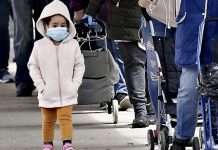July 15 (UPI) — Up to 75 countries have committed to helping poorer counterparts vaccinate their populations against COVID-19, World Health Organization officials announced Wednesday.
Taken together, the multi-national partnership, which does not include the United States, will increase funding to COVAX, the new coronavirus vaccine development platform overseen by the WHO and other organizations, the WHO officials said.
Should an effective vaccine be developed within the program, it will be available to the 165 countries that have agreed to participate, meaning more than 60 percent of the world’s population could be inoculated against SARS-CoV-2, the officials said.
“COVAX is the only truly global solution to the COVID-19 pandemic,” Dr. Seth Berkley, the GAVI chief executive officer, said in a statement.
Participating nations will “avoid being pushed to the back of the queue as we saw during the H1N1 pandemic a decade ago,” Berkley said.
Though an effective vaccine for H1N1 was developed, it was not available in time for the winter flu season in the Southern Hemisphere, and less than 900 billion doses were manufactured, according to WHO reports.
In addition, even though the United States initially pledged to donate 10 percent of its vaccine doses in September of that year, it later indicated it would not do so until all at-risk Americans had access, as production problems created supply shortages.
“Even for those countries that are able to secure their own agreements with vaccine manufacturers, this mechanism represents … a means of reducing the risks associated with individual candidates failing to show efficacy,” Berkley said.
Countries that have expressed interest in participating in the partnership include Argentina, Brazil, Canada, Ireland, Israel, Japan, Mexico, Saudi Arabia and the United Kingdom, WHO officials said.
With the funding commitment, the COVAX initiative has raised $600 million toward its $2 billion goal, according to WHO.
COVAX was created by the WHO, the global vaccine alliance GAVI and the Coalition for Epidemic Preparedness Innovations, or CEPI, to “accelerate the development, production and equitable access to COVID-19 tests, treatments and vaccines,” the WHO said.
Countries involved “share the risks associated with vaccine development” and invest in manufacturing upfront so shots can be deployed at scale as soon as they are proven effective, WHO officials said.
They added that the group should be able to to pool “procurement and purchasing power” to deliver 2 billion doses globally and approach the goal of ending the COVID-19 pandemic by 2021.
“Through COVAX, our aspiration is to be able to vaccinate the most vulnerable 20 percent of the population of every country that participates, regardless of income level, by the end of 2021,” Dr. Richard Hatchett, the CEPI chief executive officer, said in a statement.
“Ensuring fair access is not only a matter of equity. It is the fastest way to end this pandemic,” he said.
All vaccines produced through COVAX will have to receive regulatory approval or WHO prequalification before to distribution. They will be delivered equally to all participating countries, proportional to individual populations, with healthcare workers receiving priority initially, WHO officials said.
Once 20 percent of the population of all participating countries has been vaccinated against the new coronavirus, additional doses will be made available based on a country’s needs, vulnerability and the COVID-19 threat, the officials said.
COVAX also will maintain a buffer of doses for emergency and humanitarian use, they said.
To date, significant progress has already been made through the COVAX initiative, with seven of the nine candidate vaccines already in clinical trials, according to WHO.
The initiative also has signed a memorandum of understanding with drugmaker AstraZeneca to supply 300 million doses of any COVID-19 vaccines deemed safe and effective, WHO officials said.
“A lot of vaccine candidates are in development,” William Hanage, associate professor of epidemiology at Harvard T.H. Chan School of Public Health, said during a conference call with reporters Wednesday.
Hanage was speaking generally and not specifically about the COVAX initiative.
“While we don’t know if any [of the vaccine candidates] will work out well, we’re seeing positive data for some of them,” he said.







